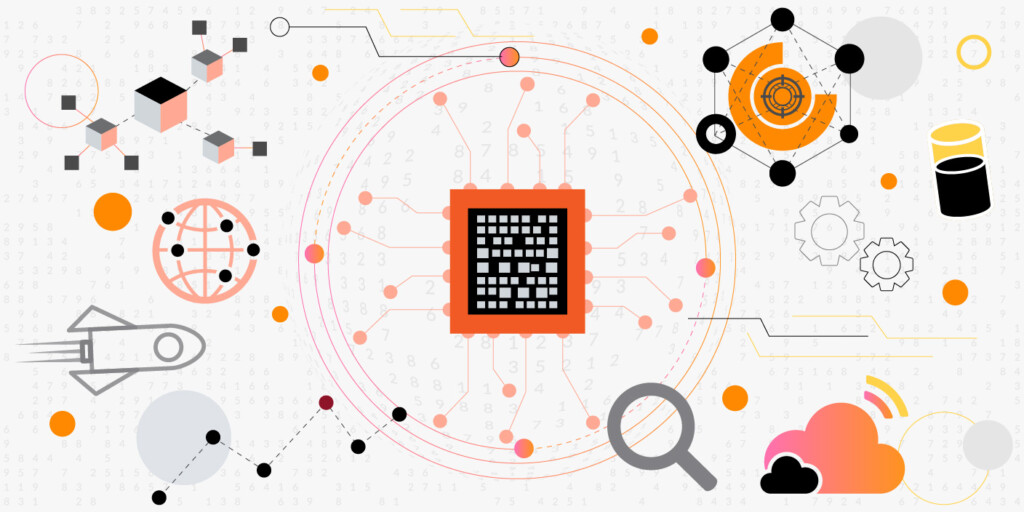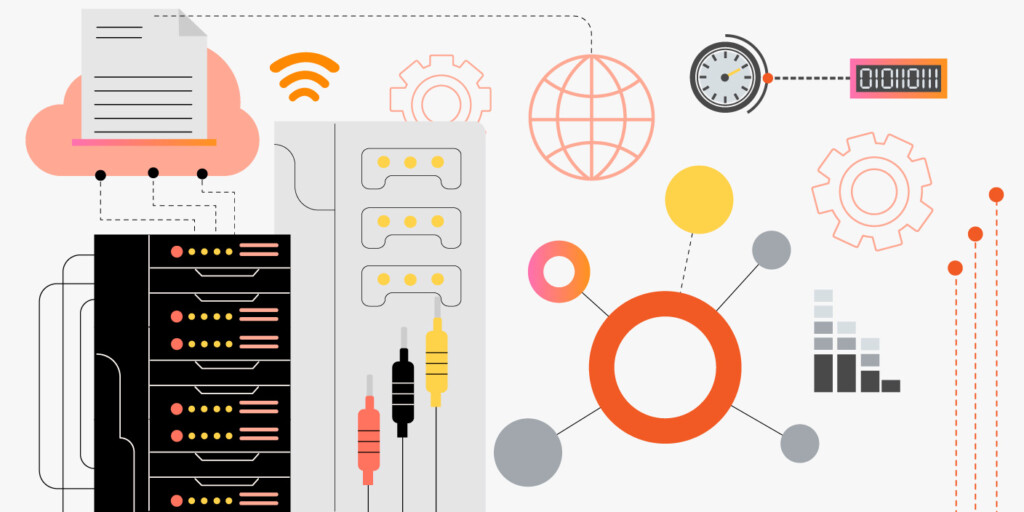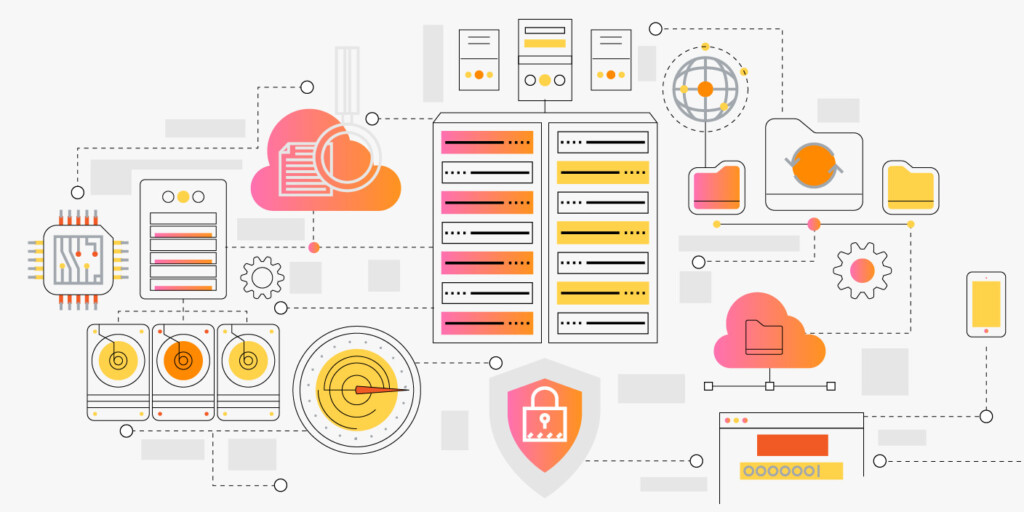

Quantum computing has the potential to completely change the current understanding of the nature of reality. There is a theory that quantum computing will reveal that the universe splits into multiple parallel universes, and each of them contains a version of reality with different outcomes. It’s still a topic of debate among physicists, but it may be true.
Does this pique your interest in quantum computing? If so, let’s dive in and explore this exciting field.
Quantum computing: definition and principles
Quantum computing seeks to harness the unique principles of quantum mechanics. At its core, quantum computing is based on the idea of using quantum bits (or qubits), which don’t only represent a single binary value, to perform computations. And the goal of the field is to create powerful new computing technologies.
Quantum computing is based on a few key principles:
- Superposition – It allows qubits to represent multiple values at the same time. For example, a qubit can represent both a 0 and a 1, whereas classical bits can only be either 0 or 1.
- Entanglement – When two qubits are entangled, their states become linked in a way that cannot be explained by classical physics. What makes it special is that information between the two qubits becomes instantly transmittable. The distance between them doesn’t matter.
- Decoherence – This one is a downside. The delicate quantum states of qubits can be disturbed by their environment, which causes them to lose their coherence. In that case, they become the same as classical bits.
The concept of quantum computing can be difficult to comprehend, even for particle physicists. The idea of superposition and entanglement can be particularly mind-bending, so it’s normal to feel that it challenges the intuition about how the world works at the subatomic level.
The rise of the technology

“The opportunity for quantum computing to solve large-scale combinatorics problems faster and cheaper has encouraged billions of dollars of investment in recent years,” note Avi Goldfarb at the Rotman School of Management and Roger Melko at the University of Waterloo.
One of the key factors driving the development of quantum computing is its potential for solving problems. For example, quantum computers have been shown to be able to solve certain types of mathematical problems exponentially faster.
Another factor is that there have been significant advances in the technology itself. Researchers have been developing new methods for building and controlling qubits, and there are new algorithms to take advantage of the unique properties of quantum computing.
Several large companies, IBM, Google, and Microsoft included, have invested heavily in quantum computing R&D. But it’s not only the tech giants that do the work. With the formation of new startups and companies, there have been a lot of exciting advancements in the field through collective effort.
What can quantum computers do?
Before covering specific industries and use cases, let’s talk about the tasks that quantum computers are capable of in broad brushstrokes.
Machine learning
As researchers delve deeper into the fundamental physical limits of information, they are breaking new ground. And now, they are uncovering novel ways to process and manipulate information.
Quantum computers can process vast amounts of data simultaneously. This makes it possible to execute large-scale, data-intensive ML algorithms much more efficiently than classical computers. Plus, new algorithms can take advantage of quantum computing’s unique properties, such as entanglement and superposition.
Optimization
One of the key advantages of quantum computing for optimization is, again, the speedup of computations. Thus, they can handle problems that are beyond the reach of other algorithms and find the best solution among many possible options.
Simulation
If you remember, qubits can exist in multiple states simultaneously. What this means for researchers and businesses is that simulations can run in parallel. There is still much research to be done to fully realize it, but it’s already used to accurately model the behavior of complex systems and to predict their properties.

Why is quantum computing important?

Let’s take stock of the information that has been discussed so far by listing the benefits of quantum computing:
- Speed – Quantum computers can leverage quantum mechanical phenomena in many fields that require quick, large-scale computations.
- Parallelism – Rather than processing information in a linear sequence, this technology can handle multiple inputs simultaneously.
- Energy efficiency – This benefit is noteworthy in light of the increasing demand for computing power and the associated energy costs.
- Secure communication – Quantum key distribution protocols and quantum-safe encryption are two examples of that. As quantum computing advances, it may be able to break many of the encryption methods currently in use, and this heightened the need for quantum-safe encryption even further.
Current industry use cases
While still in its early stages, quantum computing has already shown promising results in a range of use cases:
Pharmaceuticals
In research and development, the process of bringing a new drug to market can take up to ten years and cost an average of $2 billion. However, quantum computing can accelerate it dramatically. Even more, it can make it more targeted and precise.
Quantum computing makes target identification, drug design, and toxicity testing less dependent on trial and error. This leads to faster development and delivery of products to the right patients.
Finance
In a similar manner, quantum computing can efficiently simulate and analyze complex financial models. What would take days or even weeks to run now takes hours or even minutes.
In 2020, JPMorgan Chase launched a quantum computing initiative to explore the technology’s potential in finance. The lab’s main areas of focus are accurate predictions of financial systems and tamperproof quantum networks.
Complex manufacturing
The technology can help in identifying the root causes of product failures in a complex manufacturing process. This way, the organization will know exactly the part of the process that contributed to incidents of product failure.
For example, for products like microchips, the production process can have thousands of steps. And with the introduction of quantum computing, producers can not only prevent costly failures but also increase efficiency.
Automotive
Quantum computing also assists with vehicle design. Specifically, it helps in the development of lightweight, high-strength materials that can improve fuel efficiency and reduce emissions. As the automotive industry continues to shift towards electric and hybrid vehicles, it will play a more crucial role.
Mobility and traffic management is another area where quantum computing can provide value. For example, it can take into account factors like road conditions, weather, and traffic patterns to perform real-time route planning and reduce congestion.
Important note: These use cases above are some of the prominent areas, but they are by no means the only ones. Quantum computing is also used in cybersecurity, logistics, telecommunications, energy, and many more industries.
Upcoming developments in the next decade

“Until about 2030, we believe that quantum-computing use cases will have a hybrid operating model that is a cross between quantum and conventional high-performance computing. For example, conventional high-performance computers may benefit from quantum-inspired algorithms,” writes Juan Miguel Arrazola at Xanadu Quantum Technologies.
The hybrid model aside, the next decade promises to be a time of rapid progress in this cutting-edge field. Here are a few developments to watch out for:
- Increased qubit count – Increasing the number of qubits in a system while maintaining coherence is one of the biggest current challenges. IBM and Google are working on quantum systems with dozens of qubits. In the future, the number may grow to hundreds or even thousands.
- Improved error correction – Researchers are developing better error-correction techniques that can maintain the integrity of information despite environmental noise and decoherence.
- Quantum cryptography – When released to the market, quantum cryptography will use the behavior of subatomic particles to guarantee the confidentiality of messages. It will be impossible to observe the system without altering it.
- New practical applications – You can expect to see more practical applications of quantum computing in materials science, supply chain, weather forecasting, and more.
How will quantum computing change the world?
In an imaginary world ten years from now, a large energy company invests in quantum computing technology. They develop a quantum algorithm that can predict the energy demand in real time and optimize the distribution of energy. This leads to a significant reduction in their carbon footprint and energy costs.
The company also partners with a renewable energy provider to use quantum computing to place wind turbines and solar panels. The quantum algorithm takes into account wind speed, sun intensity, and terrain and determines the most efficient placement.
Here is another scenario: a company develops a new, quantum-resistant encryption algorithm. This algorithm can simulate a wide range of encryption scenarios and identify weaknesses that traditional computing methods couldn’t detect. This breakthrough later gets adopted by governments, financial institutions, and corporations worldwide and ushers in a new era of secure communication and data storage.
Addressing concerns about quantum computing

There are a few concerns that need to be addressed before it can be widely adopted:
- Security – Quantum computing could potentially break current encryption standards, compromising sensitive data. Thankfully, researchers are exploring new encryption techniques.
- Hardware limitations – These computers require extremely cold temperatures and precise control over their environment. But with time, hardware may become more stable and less demanding.
- Software limitations – The unique properties of quantum systems make software development more challenging. Professionals are making an effort to improve programming languages that can be adapted to the growing needs.
- Talent shortage – One way to address this concern is to invest in education and training programs for the next generation of quantum experts.
- Ethical concerns – Every new technology has the risk of being misused. Therefore, establishing ethical guidelines and regulations will be crucial to ensuring responsible use.
Steps to prepare for the maturation of quantum computing
As quantum computing is getting ready to enter a new stage of development, McKinsey shares a five-step action plan for leaders outside the quantum-computing industry:
- Stay current with industry advancements and have quantum-computing experts analyze quantum-computing applications. Additionally or alternatively, collaborate with outside researchers and participate in a quantum-computing consortium.
- Research the key risks, disruptions, and opportunities within your industry.
- Consider investing in software companies to enhance access to knowledge and talent. For a more hands-on approach, partner with them.
- Recruiting experts in-house can take your operations to the next level. A compact team of up to three specialists is enough for exploring potential use cases.
- Establish a digital infrastructure that meets the fundamental operational demands of quantum computing. This includes ensuring that relevant data is available in digital databases and configuring traditional computing workflows for more powerful hardware.
Summary
Quantum computing has the potential to revolutionize problem-solving, as proven by the current use cases. The technology exponentially increases computing power and provides solutions to previously unsolvable complex problems.
In the near future, you can expect more developments in quantum computation in the fields of medicine, finance, climate science, cryptography, energy, and more. But in the meantime, these fields need to do their part – meet the requirements for advanced infrastructure, hardware, and software.
Sources:
What is quantum computing? Amazon AWS
The world-changing race to develop the quantum computer, The New Yorker
Quantum computing use cases—what you need to know, McKinsey
Quantum computing is coming. What can it do? Harvard Business Review










